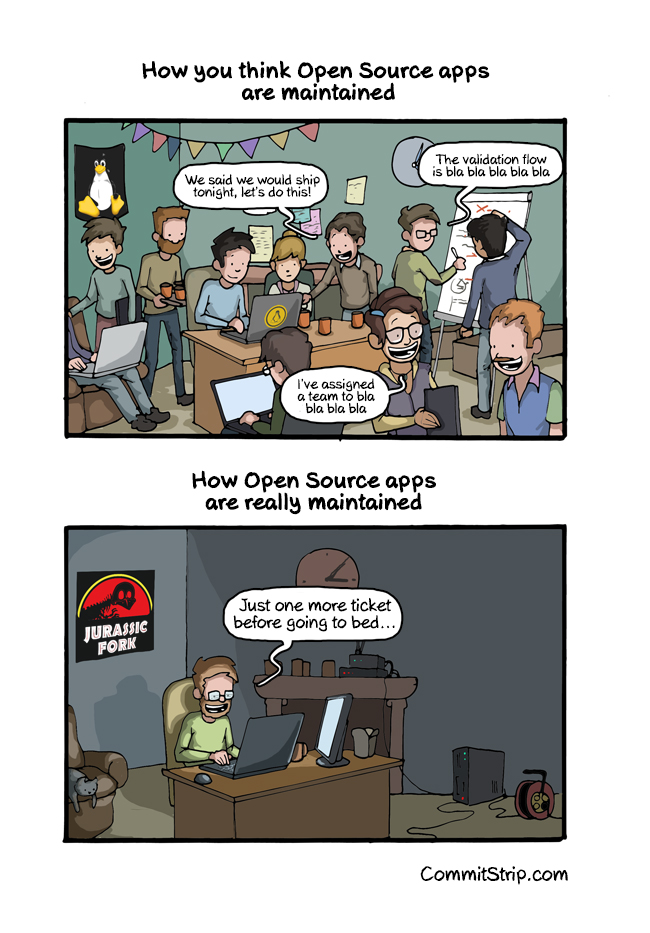How to Make Your Open Source Project Successful
The open-source projects that we know
-
Spark/Flink/Hadoop/Hive/Hbase…
-
Java/Scala/Kotlin/Rust/Python…
-
Tensorflow/Pytorch/Numpy…
-
Linux/Andriod/Chrome/VS Code/IntelliJ community…
When you program open-source, you’re programming COMMUNISM

声明:图片来自网络,不代表本人立场
What Is Open Source Project
A public available repository does not make a project Open Source.
Open Source means:
- public available(of course)
- docs about how to use/set up/build/contribute…(Not just README!)
- feature requests/bugs/issues discussion
- pull request reviews
- License & Code of conduct(Can I use that in my personal project? Do I have to make it open source?)
- Formal release!(Is that library/tool Production Ready?)
In short, that’s all means “the community”.
To make your own a successful open source project, you need…
- Play well with other open source projects
- A brilliant idea that solving a real problem.
- A quality implementation.
- Make a formal release(eg, Maven repo/gradle plugin repo/intellij plugin repo/github release)
- Not only README, but detail doc/screenshots/example code and more…
- Build your community
- Let people know your project.
- Hold your position!
- 不要使用中文
- Let The Bullets Fly(让子弹飞一会儿)
- Make your project profitable
How to contribute an Open Source project?
To learn how to manage an open-source project and how to contribute to another open-source project
What you could do?
- read README/contribution guide/License & Code of conduct first.
- Before you report a bug, you need your
Minimal reproducible codeand search first(in case this is a known issue) - Report bug
- Make pull request
- Create feature request
- Review pull request
- Participate in the issue/feature request/pr discussion
- Donating
- Write your article/tutorials/docs about this project
- Answer questions in issues/stackoverflow…
What would happen next?
- your issue/pr didn’t get any response.
- your issue is confirmed but there no plan to fix it.
Won't Fix!We won't accept your pr because...(if your a creating a BIG feature, make sure you talked with core maintainers/owner first.)Change request!Merged/FixedYey!
Solve a real problem
A quality implementation
- API design
- test case
- performance
- docs
- interact with other libs/frameworks
- less dependencies
- light weight
- …
Make a formal release
- Is your lib/tools
Production Ready? - Where your lib hosted?
- (backward&forward&binary&source)compatibility
Build your community
- Be responsive
- 👍
- Keep your decision transparent
- Docs(yes!)
Let people know your project – SEO
- Your project name is really important. it should be easy to remember, gives some idea of what the project does, and does not conflict with an existing project.
- link to other projects/names/urls/blogs/papers/libs/framworks
- other keywords
Hold your position
- Are you doing Open Source as full-time job or part-time job or just for fun?
- What would you do if there a PR that conflicts with the original design of your project?
- What would you do if there a feature request would take a lot of time to implement?
- Who are your collaborators?
不要使用中文
Let The Bullets Fly
If all goes well, there may be some tweets/blogs/official recommendations/article/tutorials talks about your project, that will make your project even more popular.
Make your project profitable
- Paypal
- Open Collective
- Patreon
- WeChat Pay/AliPay
- https://docs.github.com/en/free-pro-team@latest/github/administering-a-repository/displaying-a-sponsor-button-in-your-repository
开源项目特点
- 社区只会锦上添花而不会雪中送炭。
- 绝大部分项目都默默无闻。
- 绝大部分人都是伸手党,能够正确报bug的人都很少。
Open Source Humor

Thanks
Make sure you are will not accidentally share/open-source the code of your organization.